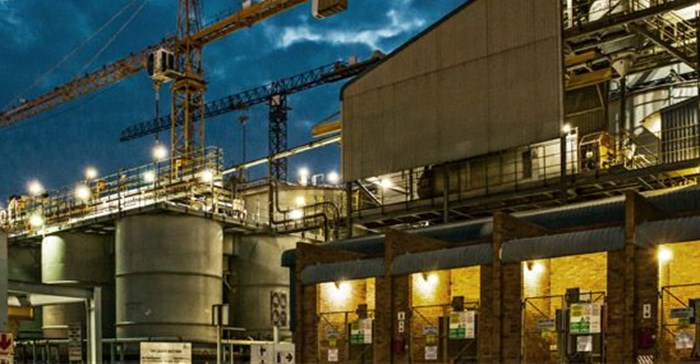South African mines have been granted state permission to generate energy for their own use without having to rely on Eskom's unstable power supply.

Gold Fields is planning a 40MW plant at South Deep Mine
“Mining companies now have several options: they could partner with independent power producers (IPPs) behind the meter (producing power onsite) or they could contract with IPPs remotely from their operations and wheel across the grid,” says Niveshen Govender, COO of the South African Photovoltaic Industry Association (Sapvia).
However, for projects with a capacity exceeding 1MW mines will have to apply for a license from the National Energy Regulator of South Africa (Nersa). Speaking at a May 2020 Mining Review Africa panel titled Self-generation: Are mining companies prepared to generate their own energy? Alexandra Felekis, who focuses on project and infrastructure finance at Webber Wentzel, raised concern that the biggest issue facing mines and IPPs is the amount of time it will take to get a license, considering Nersa is processing applications amounting to 2,000MW.
The mining industry appears to prefer building their own plants, rather than using power purchase agreements (PPAs) with independent power producers that charge for electricity consumed at an hourly rate.
Gold Fields, which is planning a 40MW plant at its South Deep Mine in Westonaria, is undertaking public hearings with Nersa. While Harmony Gold reported that three of its solar projects have received environmental authorisations with final procurement processes currently being concluded.
Nick Oosthuizen, managing director of Inframid, advised that solar projects need to have longevity as “for equipment to be feasible and offer high returns on investment, it must work for at least 25 years".
According to his experience, Oosthuizen says the adoption of renewable energies in the mining sector has been low, mainly due to high set up and energy storage costs. However, as technologies have advanced in the last decade prices have dropped significantly, making renewable energy that much more attractive for mines.
Cutting through red tape will boost investor confidence
Back in February 2017 former finance minister Trevor Manuel said that South Africans were bound and defined by mining and that investors needed to defend the sector from being seen as a ‘sunset industry’.
Government has recognised this imperative. In November, Gwede Mantashe, mineral and energy resources minister, set a national target to increase our exploration spend from 1% of global exploration share to 5%, equalling roughly $10bn per annum, within the next five years.
To implement this, the department’s new exploration strategy needs to include changes to the regulatory environment so as to make South Africa a preferred investment destination for mineral exploration and projects.
The investment community is not short of ideas when it comes to suggesting proactive steps government can take to support the industry. Suggestions made by Regina Molloy, managing director of Exploration Geological Consultancy, at a presentation to South Africa’s Overberg Geoscientists Group include:
- Making all exploration reports available to the public
- Expanding Section 12J investment tax incentives to mineral exploration
- Relaxing BEE requirements for large projects with a life of mine (LOM) of over 20 years
- Transparency in reporting, such as reporting the exploration expenditure per category per quarter, measuring the drill metres per licence category, and reporting geological unemployment trends, as an indication of the state of the industry
Certain large projects may take up to 20 years to progress through all the stages necessary to complete feasibility and regulatory issues, due to the increased focus on environmental, socioeconomic and governance (ESG). Therefore, investors need reassurance that government can be trusted to create and maintain an investor-friendly environment for new projects in the long run.
Let’s hope the new initiative announced by Mantashe will deliver on its stated objective to increase exploration investment and create a more positive investor climate for the industry.
Capitalising on robust demand for zinc, iron and manganese in the Northern Cape
When finally approved, the $400m Vedanta Zinc’s Gamsberg mine near the Northern Cape town of Aggeneys will make it a fully-integrated zinc producer, with the mine, concentrator and smelter-refinery on site.
The Department of Trade and Industry (DTI) is finalising plans for the declaration of a Namakwa Special Economic Zone (SEZ) in the area which would provide incentives of a 15% tax rate. But the green light for the expansion project is awaiting transport capacity improvements from Transnet.
Glen Mc Gavigan, executive head of technical and projects at Kumba Iron Ore, was quoted as saying that given the lack of exploration activity in South Africa over the last two decades there is opportunity to apply new technology to old prospects, particularly in terms of Northern Cape perspectivity. In July, the company approved the R7bn Kapstevel South extension at Kolomela, a mining deposit which Kumba first found in the 1950s. “The Northern Cape is under-explored, including the area we operate in,” said Mc Gavigan.
South Africa is by far the world’s largest manganese producer with an estimated 70% of global manganese reserves. Sadick Davids, Coega Development Corporation (CDC) business development metallurgic sector manager, pointed out that the Coega SEZ is the “ideal location in terms of readiness for the beneficiation of manganese”. Besides the infrastructure, the Coega SEZ also has the skills capacity for battery manufacture thanks to Eveready Batteries’ long-established operations in Port Elizabeth.
Indeed, new mining investments across South Africa need to move with the times and use new technology to drive beneficiation coupled with support from government. This will also help to provide investment certainty in terms of infrastructure support in areas such as transport and power supply.
















































